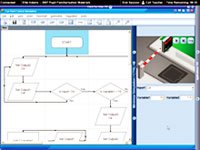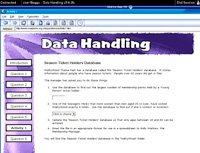Tech Literacy, the British Way: Assessing Students’ Mastery of the Computer
Schools in England begin using a literacy test to gauge application of technical skills to everyday life.
Your content has been saved!
Go to My Saved Content.The English government has tackled head-on the need to cultivateone essential twenty-first-century skill: computer literacy.This year, schools began using the ICT Literacy Test forstudents ages 11-14 to gauge not only their mastery of technicalskills but also their readiness to apply these skills effectively ineveryday life and work.
Far beyond the simple keyboarding tests of old, this exam challengesstudents to create presentations with text and images,manipulate databases, and write simple computer programming,among other skills. Basic techniques such as saving information,using email, and doing simple searches are included, too. Thetest, taken entirely on a computer, embeds these assignments inpractical tasks, all done in the virtual town of Pepford.
Sue Walton, project director at England's NationalAssessment Agency, an arm of the Qualifications and CurriculumAuthority (QCA), explains that the emphasis is onstudents "actually being asked to do things."

To begin, a student might receive an emailfrom the director of the local visitor center assigninghim to design a tourist brochure, or from thePepford High School principal requesting that sheassess the effectiveness of a recent campaign to promote eatingfruit instead of candy. Then the student would use information,charts, photographs, and other resources available within the virtualPepford world to solve the problem. Test makers designed afull set of generic software -- an email program, a Web browser, adatabase manager, and more -- to avoid endorsing any one commercialbrand or favoring students who are already familiar withcertain programs.

Students' responses are scored dynamically, meaning that thecomputer captures the process they use to answer a question.For instance, if the test asks pupils to use a database to figurehow many musicians play rock music, they could do this simply bycounting or by using the filter, sort, or query tools. The computergives students credit for a right answer while also evaluating theirprocess and producing an instant report on how basic or advancedtheir skills are.
By the end of 2008, a battery of fifteen- to thirty-minute taskswill be available to teachers on demand, anytime. The test is notmandatory, but it's free, and Walton expects most schools to useit to help tailor instruction.
Creating a test like this demands investment of time and money:All told, the QCA put about $46 million into this six-year project.
This article was updated on 4/08/08 to correct that the ICT literacy test is a program in England.